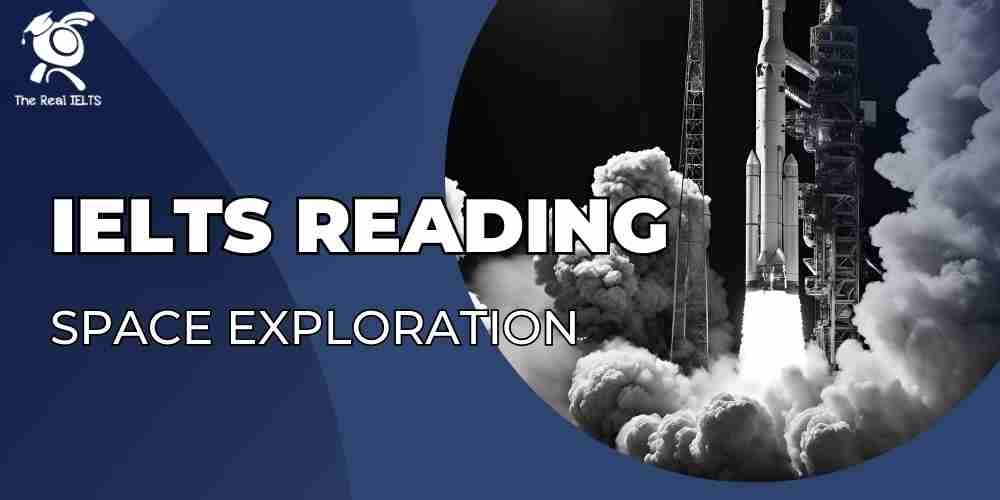Luyện tập IELTS Reading ngày 3 có chủ đề: Space Exploration: Benefits and Drawbacks. Bài này thuộc chuỗi IELTS Reading: 30 chủ đề luyện tập.
Học lại bài cũ: IELTS READING Day 2: The Role of Renewable Energy in Combating Climate Change.
30 phút luyện tập IELTS Reading và trả lời câu hỏi ở bên dưới
Space exploration has captivated human imagination for centuries. From early stargazing to advanced space missions, humanity has continuously sought to explore the vast expanse of the cosmos. The progress in space exploration, particularly since the mid-20th century, has yielded numerous scientific, technological, and societal benefits. However, it also poses significant challenges and drawbacks, prompting debate on the necessity of such endeavors. This article explores both the benefits and drawbacks of space exploration.
Benefits of Space Exploration
- Technological Advancements
Space exploration has driven significant technological innovations, many of which have trickled down into everyday life. Technologies originally developed for space missions, such as satellite communication, weather forecasting, and GPS systems, have become integral to modern society. Advanced materials, miniaturized electronics, and medical innovations, like MRI scanners, are direct results of space-related research. The challenge of creating sustainable life support systems in space has also influenced developments in renewable energy, water purification, and agricultural techniques on Earth. - Scientific Knowledge
One of the core purposes of space exploration is to increase our understanding of the universe. By studying other planets, stars, and galaxies, scientists have uncovered valuable insights into the origins of the universe, planetary systems, and potentially habitable environments. For instance, missions to Mars and moons like Europa and Enceladus have raised the possibility of finding microbial life beyond Earth, expanding our understanding of biology. The study of cosmic phenomena, such as black holes and dark matter, has also advanced our grasp of fundamental physics. - Economic Opportunities
The space industry offers significant economic potential. With the commercialization of space, private companies like SpaceX, Blue Origin, and others are developing new revenue streams through satellite launches, space tourism, and the potential mining of asteroids for rare materials. The space economy could be worth trillions in the future, creating jobs and new industries. Additionally, satellite technologies support industries like telecommunications, navigation, and climate monitoring, providing essential services to global economies. - Inspiration and Unity
Space exploration often serves as a source of inspiration, encouraging future generations to pursue careers in science, technology, engineering, and mathematics (STEM). Events like the Apollo moon landing in 1969 captured the world’s attention and symbolized the potential for human achievement. Additionally, international collaboration on projects like the International Space Station (ISS) fosters cooperation between nations, transcending political differences and promoting a sense of global unity in the pursuit of knowledge. - Planetary Defense
A critical benefit of space exploration is the ability to monitor and potentially prevent asteroid impacts on Earth. Space agencies are developing early detection systems to identify near-Earth objects (NEOs) that could pose a threat to our planet. Future missions may include deflecting hazardous asteroids away from Earth, a capability that could prevent mass extinctions like the one that wiped out the dinosaurs.
Drawbacks of Space Exploration
- High Costs
One of the most significant criticisms of space exploration is the enormous financial cost. Space missions require vast amounts of funding, often running into billions of dollars. Critics argue that these resources could be better spent addressing pressing issues on Earth, such as poverty, healthcare, and climate change. For example, NASA’s 2021 budget was approximately $23 billion, a figure some believe could make a more immediate impact if redirected toward social programs. - Risks to Human Life
Space exploration is inherently dangerous. Astronauts face a variety of life-threatening risks, including exposure to radiation, the physical effects of prolonged weightlessness, and the potential for catastrophic equipment failure. Past disasters, such as the Challenger and Columbia space shuttle accidents, serve as tragic reminders of the dangers involved. The farther humans venture from Earth, the more complex and perilous these missions become, especially as plans for long-term colonization of planets like Mars are being considered. - Environmental Impact
While space exploration contributes to technological and scientific advancements, it also has environmental consequences. Rocket launches release large quantities of carbon dioxide and other pollutants into the atmosphere, contributing to climate change. Space debris, or “space junk,” is another growing issue. As more satellites and other objects are sent into orbit, collisions and the accumulation of debris pose hazards to future missions and the sustainability of space activities. - Ethical and Moral Concerns
The ethics of space exploration raise several questions. One concern is the prioritization of space over addressing urgent issues on Earth, such as inequality and humanitarian crises. Critics also point out that the commercialization of space could lead to exploitation, where wealthy nations or corporations claim ownership of extraterrestrial resources, exacerbating global inequality. Additionally, the potential contamination of other planets with Earth-based organisms raises ethical dilemmas regarding the preservation of extraterrestrial environments. - Resource Drain
Space exploration requires significant human, scientific, and material resources. Developing space missions often diverts attention from other critical areas of scientific research, such as renewable energy, medicine, and climate science. With the growing urgency of the climate crisis and other global challenges, some argue that investing heavily in space exploration is a misallocation of priorities, especially when immediate solutions are needed for terrestrial problems.
Space exploration is a complex endeavor that offers substantial benefits but also comes with considerable drawbacks. On the one hand, it drives technological innovation, expands scientific knowledge, and offers economic and inspirational opportunities. On the other hand, it is costly, risky, and presents ethical, environmental, and resource-related challenges. As humanity continues to explore space, balancing the benefits with the drawbacks will be crucial to ensuring that the pursuit of knowledge aligns with the broader needs of society and the planet.
Từ vựng
- Space exploration – thám hiểm không gian
- Technological advancements – tiến bộ công nghệ
- Satellite communication – truyền thông qua vệ tinh
- Weather forecasting – dự báo thời tiết
- GPS systems – hệ thống định vị toàn cầu
- Materials – vật liệu
- Miniaturized electronics – điện tử thu nhỏ
- Medical innovations – đổi mới y tế
- Life support systems – hệ thống hỗ trợ sự sống
- Renewable energy – năng lượng tái tạo
- Water purification – lọc nước
- Agricultural techniques – kỹ thuật nông nghiệp
- Scientific knowledge – kiến thức khoa học
- Planets – các hành tinh
- Stars – các ngôi sao
- Galaxies – các thiên hà
- Origins of the universe – nguồn gốc của vũ trụ
- Planetary systems – hệ hành tinh
- Microbial life – sự sống vi sinh
- Cosmic phenomena – hiện tượng vũ trụ
- Black holes – hố đen
- Dark matter – vật chất tối
- Fundamental physics – vật lý cơ bản
- Economic opportunities – cơ hội kinh tế
- Commercialization – thương mại hóa
- Space tourism – du lịch vũ trụ
- Asteroids – tiểu hành tinh
- Satellite technologies – công nghệ vệ tinh
- Telecommunications – viễn thông
- Navigation – điều hướng
- Climate monitoring – giám sát khí hậu
- Inspiration – cảm hứng
- International collaboration – hợp tác quốc tế
- International Space Station (ISS) – Trạm Vũ trụ Quốc tế
- Planetary defense – phòng thủ hành tinh
- Asteroid impacts – tác động của tiểu hành tinh
- Near-Earth objects (NEOs) – các đối tượng gần Trái Đất
- Deflecting – chuyển hướng
- Mass extinctions – sự tuyệt chủng hàng loạt
- High costs – chi phí cao
- Funding – tài trợ
- Social programs – các chương trình xã hội
- Risks to human life – rủi ro đối với tính mạng con người
- Radiation – bức xạ
- Weightlessness – trạng thái không trọng lượng
- Catastrophic equipment failure – sự hỏng hóc thiết bị thảm khốc
- Space shuttle accidents – tai nạn tàu con thoi
- Colonization – sự thuộc địa hóa
- Environmental impact – tác động môi trường
- Rocket launches – phóng tên lửa
- Carbon dioxide – khí carbon dioxide
- Space debris – mảnh vụn không gian
- Space junk – rác vũ trụ
- Collisions – va chạm
- Ethical concerns – mối lo ngại về đạo đức
- Moral concerns – mối lo ngại về đạo lý
- Prioritization – ưu tiên
- Humanitarian crises – các cuộc khủng hoảng nhân đạo
- Exploitation – sự khai thác
- Extraterrestrial resources – tài nguyên ngoài hành tinh
- Global inequality – bất bình đẳng toàn cầu
- Contamination – sự ô nhiễm
- Resource drain – sự hao tốn tài nguyên
- Scientific research – nghiên cứu khoa học
- Climate science – khoa học khí hậu
- Climate crisis – khủng hoảng khí hậu
- Terrestrial problems – các vấn đề trên Trái Đất
Câu hỏi IELTS Reading
1. Multiple Choice (Chọn một đáp án đúng)
1.1. What is one of the primary purposes of space exploration?
A. To create more satellites
B. To generate economic revenue
C. To understand the universe better
D. To colonize other planets
1.2. Which of the following is considered a drawback of space exploration?
A. It provides economic opportunities
B. It promotes international collaboration
C. It has a high financial cost
D. It leads to environmental improvements
2. True/False/Not Given (Chọn True, False, hoặc Not Given)
2.1. Space exploration has led to advancements in medical technology.
True / False / Not Given
2.2. All countries equally contribute to space exploration efforts.
True / False / Not Given
2.3. Asteroid mining is already a common practice in space exploration.
True / False / Not Given
3. Matching Information (Nối thông tin)
3.1. Match the following benefits or drawbacks to their corresponding descriptions:
A. Technological innovations
B. Environmental impact
C. Risks to human life
D. Economic opportunities
- The release of carbon dioxide from rocket launches
- The possibility of creating new industries and jobs
- The development of materials and miniaturized electronics
- The danger astronauts face due to exposure to radiation
4. Short Answer (Trả lời ngắn)
4.1. What are two technological innovations that have resulted from space exploration?
4.2. How does space exploration inspire future generations?
4.3. What is one ethical concern regarding space commercialization?
5. Sentence Completion (Hoàn thành câu)
5.1. Space exploration helps scientists study ____ like black holes and dark matter.
5.2. The commercialization of space could potentially create ____ for rare materials.
5.3. Rocket launches contribute to environmental damage by releasing ____ into the atmosphere.
6. Summary Completion (Hoàn thành đoạn tóm tắt)
Complete the summary using words from the passage:
Space exploration has contributed significantly to technological progress, including innovations in (6.1) ____ and (6.2) ____. However, it also raises concerns, particularly regarding the (6.3) ____ costs involved and the (6.4) ____ risks faced by astronauts. Additionally, the growing issue of (6.5) ____ poses a challenge to the sustainability of future missions.
Đáp án IELTS Reading
1. Multiple Choice (Chọn một đáp án đúng)
1.1. What is one of the primary purposes of space exploration?
C. To understand the universe better
1.2. Which of the following is considered a drawback of space exploration?
C. It has a high financial cost
2. True/False/Not Given (Chọn True, False, hoặc Not Given)
2.1. Space exploration has led to advancements in medical technology.
True
2.2. All countries equally contribute to space exploration efforts.
False
2.3. Asteroid mining is already a common practice in space exploration.
False
3. Matching Information (Nối thông tin)
A. Technological innovations – 3. The development of materials and miniaturized electronics
B. Environmental impact – 1. The release of carbon dioxide from rocket launches
C. Risks to human life – 4. The danger astronauts face due to exposure to radiation
D. Economic opportunities – 2. The possibility of creating new industries and jobs
4. Short Answer (Trả lời ngắn)
4.1. What are two technological innovations that have resulted from space exploration?
- Satellite communication and medical innovations (or any other relevant answers from the passage).
4.2. How does space exploration inspire future generations?
- It encourages them to pursue careers in science, technology, engineering, and mathematics (STEM).
4.3. What is one ethical concern regarding space commercialization?
- The potential exploitation of extraterrestrial resources or the prioritization of space over pressing Earth issues.
5. Sentence Completion (Hoàn thành câu)
5.1. Space exploration helps scientists study ____ like black holes and dark matter.
- cosmic phenomena
5.2. The commercialization of space could potentially create ____ for rare materials.
- economic opportunities
5.3. Rocket launches contribute to environmental damage by releasing ____ into the atmosphere.
- carbon dioxide
6. Summary Completion (Hoàn thành đoạn tóm tắt)
Complete the summary using words from the passage:
Space exploration has contributed significantly to technological progress, including innovations in (6.1) satellite communication and (6.2) medical technologies. However, it also raises concerns, particularly regarding the (6.3) high costs involved and the (6.4) risks faced by astronauts. Additionally, the growing issue of (6.5) space debris poses a challenge to the sustainability of future missions.















